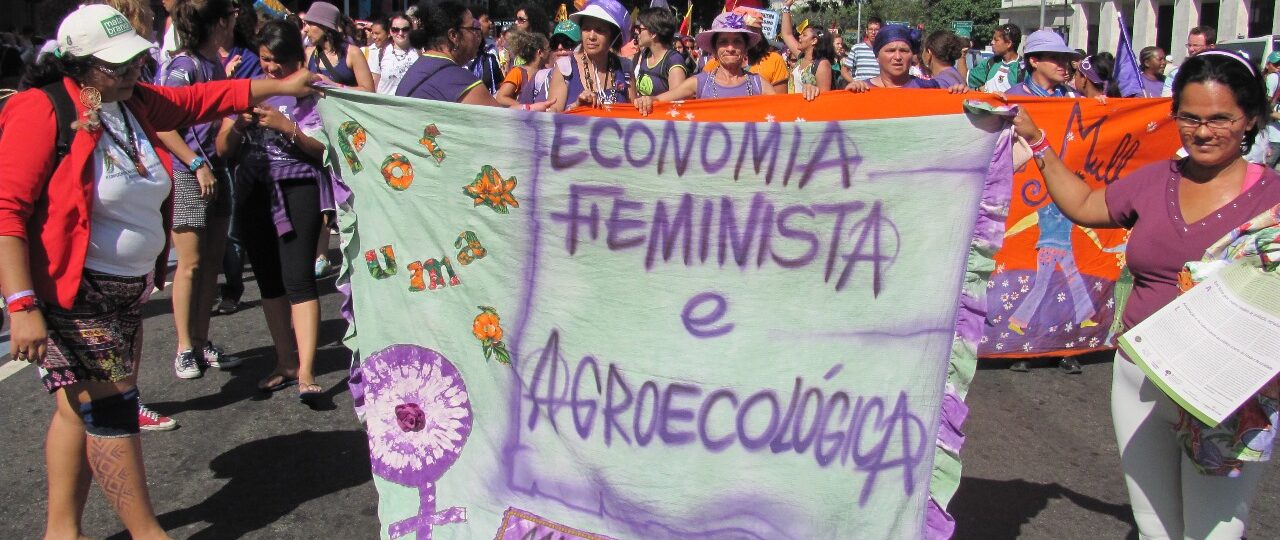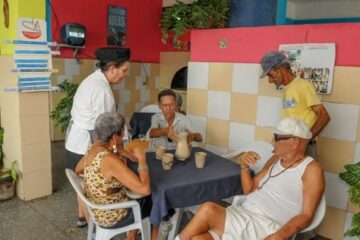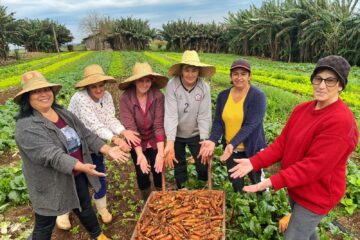By articulating theory, practice, and movement, in the World March of Women, feminist economy is much more than a set of concepts applied to explain the economy: it is a strategy to face racist and patriarchal capitalism and build societies based on the sustainability of life.
Feminist economy helps us understand reality from the places where women live: where they organize and resist to the paces and violence of capital against life, where they fight for every inch of territory against mining and agribusiness transnational corporations, where they build communities through relationships based on the care for people and nature, agroecological production, and solidarity economy. Feminist economy, therefore, is not a fixed theory, but it is rather moving—and it is produced in movement. “We must go from practice to theory,” militants said during the International Meeting in the Philippines in 2011, asserting grassroots feminism as a producer of knowledge.
Theoretical and political movement-building efforts have been made over the course of 25 years through processes of organization, political education, and struggle. In this writing, we look back on some of the milestones of the process that has built this political vision and point out some of the challenges of the current context.
Some Background: Milestones of the World March of Women’s Formulations on Feminist Economy
Tackling the causes of poverty and violence have been the pillars around which the WMW has established itself as an anti-capitalist and anti-patriarchal movement. Since its origins, the movement’s militants saw that it was necessary to further develop shared feminist views on the economy. It was the time when neoliberal globalization was becoming deeper. In 2001, the delegates to the WMW International Meeting argued that it was not enough to include women in the policies of economic liberalism. It was necessary to challenge and change the logic of accumulation of capital that guide commercial policies. This perspective has challenged the institutionalized practices that were then hegemonic in international feminism, which was orbiting around the UN.
Our sisters from African countries brought together the discussion around the economic model with the critique of the war policy. According to this Meeting’s report, it was necessary to go beyond denouncing the impacts of globalization on women’s lives and organize “alternatives, always considering the specific concerns of the world’s big regions that are often neglected, reiterating the need to build a new model of society based on the premise of ending all wars around the world.”
Women from the global South felt like the market was reorganizing their lives, and militants were waging grassroots struggles against free trade agreements, especially against the FTAA in the Americas and against foreign debt in Africa. By building grassroots feminism, deeply rooted in the territories, it became clear that it was not enough to include women in an economic model based on inequality and the international, sexual, and racial division of labor.
When our sisters heard about the potential impacts of free trade agreements on their lives, they reflected about how that was already their reality. And so they denounced that such agreements were instruments to prevent countries in the global South from being sovereign, by keeping them in a subordinate relationship with the powers of the North. The privatization of public services—in the parts of the world where they existed—or their lack thereof shed light on the overload shouldered by women, as they lack support for social reproduction—to fetch water, prepare food, care and educate children, care for the sick.
As we read in 2023 the records and documents of the WMW International Meetings, two aspects stand out regarding its movement building. On the one hand, they insist on the need to propose alternatives and foster feminist practices for change, a pillar of action in which feminist economy has gained relevance. On the other, the building of strategic alliances in which unity and strength are built in common action while the formulations of each organization are incorporated by the others, in a process of “interpollination” of struggles.
This allows us to move forward in programmatic syntheses. Some examples: in 2003, during the International Meeting in Rwanda, a plan was introduced by a working group on Economic Alternatives, which involved different national coordinating bodies in a process of common formulation. Alliances were also becoming stronger through this space. The assemblies of social movements in the World Social Forum process meant an important moment of joint organizing efforts, as well as the struggles against the World Trade Organization, processes in which an alliance was built very closely with the Latin American Network Women Transforming the Economy (REMTE) and with the women of La Via Campesina. These two organizations have greatly contributed to the formulations of the WMW about feminist economy and food sovereignty.
In 2006, the final declaration of the International Meeting held in Peru presented three fundamental aspects of our formulation: the need to disrupt the capitalist and patriarchal separation between production and reproduction—which devalues and subordinates social reproduction—, the criticism of the devastating effects of neoliberalism and militarism on the planet, and the denunciation that imperialism hinders the peoples’ sovereignty over their territories, their nations, and their politics. These aspects remain part of the challenges of our current times.
Similarly, when the World March of Women defines four action areas, as part of the 3rd International Action in 2010, feminist economy is explicitly presented as a principle to be developed, as part of the action area on women’s work and economic autonomy. This action area has organized the movement’s views around the defense of equality, rights, and social security for all women workers, especially migrants and domestic workers, and centered its denunciation around the role of transnational companies in the exploitation of women’s work.
According to this document, “We use feminist economics to make women’s contribution to the economy more visible, to highlight their experiences and to show how the production of merchandise is linked with social reproduction, that is, the production of people and of life: pregnancy and giving birth; the care of children, the sick and elderly; the care of adult men in order for them to be available and healthy for the labour market. Care implies not only the preparation of food, cleaning the house and washing and ironing, but also affection and emotional security and the sustaining of the social network that keeps families, neighbourhoods and communities together.”
Sustainability of Life on Center Stage
Over the past decade, the formulations on feminist economy in the World March of Women have greatly advanced. The participation in international mobilizations against false solutions for the climate crisis has contributed to affirm feminist economy as a grassroots solution for the causes of the multi-dimensional crisis we are facing. Feminist economy, food sovereignty, and environmental justice feed off each other, and from concrete territories and strategic alliances, we affirm interdependence and ecodependence as the basis of the relationships between people and between people and the planet.
Feminist economy has become consolidated as a strategy for the WMW and guides us as we face the challenges of each scenario. And so it did during the COVID-19 pandemic, when we mobilized wherever we were organized to take care of life through grassroots solidarity and demand a social reorganization of care in economic recovery policies.
Also during this period, feminist economy was one of the pillars of our process of feminist education at the Berta Cáceres International Feminist Organizing School (IFOS). The power of feminist economy as a proposal and strategy was clear during the School, as well as the acknowledgment of the diversity of feminist experiences, struggles, and practices to change the economy that women build every day. Along this path, a programmatic synthesis moved forward pointing toward feminist economy as a strategy based on the sustainability of life and food sovereignty.
We have incorporated the perspective that the conflict of capital against life is becoming deeper in current times. This vision is not fragmented, but realizes how the processes that sustain life are attacked on a daily basis by the logic of capital accumulation. The sustainability of life is not compatible with capitalism. A humane capitalism is not possible, nor a greenwashed or purplewashed one, as transnational companies have been presenting themselves around the world. To face the racist and patriarchal capitalism, speeches are not enough. We must build grassroots strength and concrete struggles. In the WMW, identifying common struggles is a movement-building method that connects us from the local to international level, in a circular motion: changing the world to change women’s lives; change women’s lives to change the world.
The economy is inseparable from polity. This is also why feminist economy is a tool to tackle today’s difficult political situation, locally as well as internationally. This means updating our understanding about the capital-life conflict in today’s context of rising far-right authoritarianism, deeply imbricated with market authoritarianism, operated by the corporate power of transnational corporations. Heteropatriarchal and racist conservatism becomes worse, using all forms of violence to try to discipline dissident bodies and sexualities. US imperialism, along with its allies, uses all its instruments—sanctions, blockades, coups, criminalization, hybrid and full-blown wars—aiming to undermine all forms of counter-hegemonic efforts and people’s sovereignty.
The knowledge and understanding we have accumulated from feminist economy position us as we face tensions and changes in the world order. By placing the sustainability of life and food sovereignty on center stage, we ask new questions and find collective answers: How can we expand and empower grassroots feminism, facing the acceleration of the times ruled by now digital capitalism?
How to bring together de-dollarization and integration between the peoples aiming at economic processes that promote the sustainability of life, acknowledging and respecting the diversity of ways of producing and living? What strategies should we have to put an end to current wars and stop new ones from happening, making sure the wealth produced by the people is invested in good living? How to bring together food sovereignty, energy sovereignty, and technological sovereignty withing grassroots feminist projects?
To consider new questions and prepare collective answers, we look back on a formulation by the World March of Women Americas during its 5th International Action, in 2020. Aiming to answer to what it means to put life on center stage, they argue “as key to the sustainability of life: the free self-determination of bodies and territories; the importance of looking back at our history, our memory, our knowledge and our ancestral practices of indigenous peoples, Afrodescendants and women; a change in the way of consuming, producing and reproducing life; making visible, recognizing and above all reorganizing domestic and care work, with joint responsibility between men, communities, the State and women; designing justice systems that do not reinforce oppression and recognizing the citizenship of migrants and the diversity of sexual identities; sovereign peoples and democracies founded on popular power; public services which guarantee social reproduction and States that are founded on the common and the recognition of community values, such as self-management; the de-commodification of life and the end of transnational corporate power; challenging the financialization of life and debt, strengthening the real economy – in the other words, the economy at the service of humanity and its life – in harmony with the planet and the rest of its inhabitants.”




